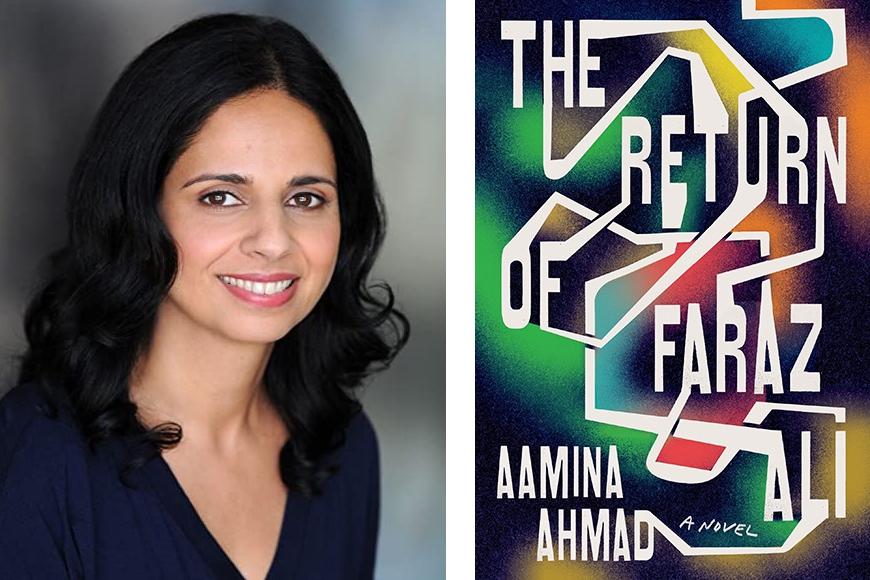Meet Assistant Professor Aamina Ahmad
Novelist Aamina Ahmad's mother is a writer and playwright who ran a theater company when Ahmad was growing up. "I was lucky enough to grow up around a lot of writers, actors, and directors," says the new Creative Writing professor. "I saw the reality of what it was like to try to make art, the immense challenges of it, particularly if you were creating from the margins, but I also got a glimpse of what it means to be part of an artist community. It made me feel like, hard as it might be to do this work, if you have the support of a community, it is possible."
Ahmad published her debut novel The Return of Faraz Ali (Riverhead) in April of 2022; a front cover review in the New York Times Book Review found it "stunning not only on account of the writer’s talent, of which there is clearly plenty, but also in its humanity, in how a book this unflinching in its depiction of class and institutional injustice can still feel so tender." The book is shortlisted for Best First Novel by the Writers Guild of Great Britain. Ahmad's short fiction has appeared in the anthology And the World Changed as well as in several journals. Her play The Dishonored was produced by Kali and toured the UK in 2016. She has received a Pushcart Prize and a Rona Jaffe Writer's Award. Raised in London, Ahmad holds an MFA in fiction from the Iowa Writers' Workshop and received a Stegner Fellowship from Stanford University. She was Li-shen Visiting Writer at Mills College 2020-2021. She generously responded to our questions, below.
What course have you most enjoyed teaching?
I always love teaching screenwriting largely because the students who step into the classroom are such big fans of the medium, and they bring with them the expertise of an audience that's well-versed in the conventions of genre and the language of film. That knowledge becomes a fantastic springboard for them to play and experiment. And they're so game for anything—this semester they've performed scenes, shot scenes on their phones, and produced incredible, exciting scripts. It's such a joy to read their work, and I just really want their movies to get made.
What is your favorite work to teach?
I never tire of reading Mrs. Bridge by Evan Connell. I am always curious as to how the students will react to it; I love it, and I want them to love it, too (of course, not all of them do). But the reason I think it's my favorite book to teach is that its workings on the level of craft are still a mystery to me. Connell tells a story about a woman who leads a very ordinary if privileged life, is limited in all sorts of ways, and, in addition, nothing very extraordinary happens—and yet it's one of the most riveting and fascinating books I've ever read. I hope, every time I teach it, that I will get somewhat closer to uncovering its secrets.
Advice for current English majors and minors?
I remember as an English student feeling overwhelmed by my reading lists, but now, looking back, I realize it was one of the few periods of my life when I had real time to read, to engage with a text, and just sit with it. I know with the pressure of workloads it isn't always easy to feel like you have time—the impulse to rush through it all, to just get it done is immense—but I would say try as much as possible to give yourself time to mull and reflect on your reading.
The writer Tsering Yangzom Lama says there's something sacred in the act of writing and sharing stories, and I think perhaps that's also true when we engage with them, think about them, and when we talk about them. When I think about reading in this vein, what it really means to work with a text, it feels like there's no better way I could spend my time.
Where did you grow up? Is there anything you miss?
I grew up in London, and I miss so many things! I miss family and friends, of course, but London remains for me the greatest capital city in the world. It's so ancient and storied, but it's also pretty edgy and forward-looking; it's incredibly diverse, and culturally so rich. A few things I pine for on a regular (in some cases, daily) basis: the Tube, Dairy milk chocolate, proper fish and chips, and the sound of different London accents.
What was the most intriguing piece of writing you've encountered this past year?
I absolutely loved Lan Samantha Chang's The Family Chao. It's a gripping read that kept me up half the night (I have no regrets!). But it's also such an intelligent, nuanced exploration of the complicated ways in which racism operates. It pays homage to The Brothers Karamazov, so it's interesting on that level too. And, quite honestly, it's hilarious.



